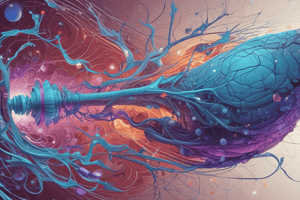Podcast
Questions and Answers
What does JP's concept of Total Revolution emphasize?
What does JP's concept of Total Revolution emphasize?
- A comprehensive change in all aspects of society (correct)
- A violent overthrow of existing governments
- The necessity of external assistance for reform
- A change in political leadership only
Which of the following revolutions does JP consider not total?
Which of the following revolutions does JP consider not total?
- The French Revolution (correct)
- The American Revolution
- The Chinese Revolution (correct)
- The Russian Revolution (correct)
What does JP believe about the role of political power in society?
What does JP believe about the role of political power in society?
- It does not bring true change in society (correct)
- It should be preserved at all costs
- It is the only avenue for change
- It requires military enforcement to be effective
How did JP's studies influence his idea of Total Revolution?
How did JP's studies influence his idea of Total Revolution?
Which elements are part of the seven revolutions that JP speaks of?
Which elements are part of the seven revolutions that JP speaks of?
What core values were central to JP's belief in Total Revolution?
What core values were central to JP's belief in Total Revolution?
What does JP consider essential for achieving Total Revolution?
What does JP consider essential for achieving Total Revolution?
What perspective does JP's concept of revolution abandon compared to past revolutions?
What perspective does JP's concept of revolution abandon compared to past revolutions?
What does JP identify as essential for a complete and constructive transformation of society?
What does JP identify as essential for a complete and constructive transformation of society?
How does JP view the current state of democracy?
How does JP view the current state of democracy?
What does JP suggest is necessary along with political changes for societal health?
What does JP suggest is necessary along with political changes for societal health?
What is one of the key aspects of JP's Seven Pillars of Total Revolution?
What is one of the key aspects of JP's Seven Pillars of Total Revolution?
According to JP, what is necessary for a good political structure to succeed?
According to JP, what is necessary for a good political structure to succeed?
Which of the following best describes JP's concept of the 'grains of sand' analogy for democracy?
Which of the following best describes JP's concept of the 'grains of sand' analogy for democracy?
What kind of revolution does JP advocate as necessary for India?
What kind of revolution does JP advocate as necessary for India?
What is implied by JP's statement about changing the mindset of the people?
What is implied by JP's statement about changing the mindset of the people?
What was the primary influence on JP's thinking that directed him towards the Sarvodaya movement?
What was the primary influence on JP's thinking that directed him towards the Sarvodaya movement?
Which statement best describes JP's view on the means of achieving true revolution?
Which statement best describes JP's view on the means of achieving true revolution?
What was a key component of JP's philosophy of Total Revolution?
What was a key component of JP's philosophy of Total Revolution?
How did JP express the goals of Total Revolution during his speech on June 5, 1974?
How did JP express the goals of Total Revolution during his speech on June 5, 1974?
In what way did JP's Total Revolution aim to affect Indian society?
In what way did JP's Total Revolution aim to affect Indian society?
What aspect of revolution did JP highlight as not being limited to political changes?
What aspect of revolution did JP highlight as not being limited to political changes?
What did JP dedicate the latter part of his life to after being influenced by Vinoba Bhave?
What did JP dedicate the latter part of his life to after being influenced by Vinoba Bhave?
What did JP propose as necessary for creating a strong Indian democracy?
What did JP propose as necessary for creating a strong Indian democracy?
What qualities does leadership possess that can influence a nation?
What qualities does leadership possess that can influence a nation?
What were the motives of Mahatma Gandhi, Vinoba Bhave, and Jay Prakash Narayan in their movements?
What were the motives of Mahatma Gandhi, Vinoba Bhave, and Jay Prakash Narayan in their movements?
How did Jay Prakash Narayan view capitalism during his time in America?
How did Jay Prakash Narayan view capitalism during his time in America?
What major philosophical shift did Jay Prakash Narayan undergo during his studies in America?
What major philosophical shift did Jay Prakash Narayan undergo during his studies in America?
Which revolutionary ideology profoundly influenced Jay Prakash Narayan earlier in his life?
Which revolutionary ideology profoundly influenced Jay Prakash Narayan earlier in his life?
What was the primary focus when Jay Prakash Narayan returned to India from America?
What was the primary focus when Jay Prakash Narayan returned to India from America?
What differing views did Jay Prakash Narayan develop over time regarding Mahatma Gandhi's approach?
What differing views did Jay Prakash Narayan develop over time regarding Mahatma Gandhi's approach?
At what age was Jay Prakash Narayan first aware of political activities?
At what age was Jay Prakash Narayan first aware of political activities?
What should be the core of any education system according to JP?
What should be the core of any education system according to JP?
Which dimension does JP NOT include in his vision of Total Revolution?
Which dimension does JP NOT include in his vision of Total Revolution?
How does JP view the current education system regarding skill development?
How does JP view the current education system regarding skill development?
What does JP believe should happen even if someone has not completed their formal education?
What does JP believe should happen even if someone has not completed their formal education?
What did JP mean by 'meaningless education'?
What did JP mean by 'meaningless education'?
What is an urgent need identified by JP in the education system?
What is an urgent need identified by JP in the education system?
What is a primary criticism JP has towards the motivation for studying?
What is a primary criticism JP has towards the motivation for studying?
What does JP suggest should be included in the education system to help young people?
What does JP suggest should be included in the education system to help young people?
Flashcards
Total Revolution
Total Revolution
A movement aiming for a comprehensive transformation of society, encompassing economic, social, and political spheres, not solely focused on achieving power.
Jayaprakash Narayan (JP)
Jayaprakash Narayan (JP)
A prominent Indian political leader and social reformer noted for his commitment to the welfare and advancement of India, and his advocacy for a total revolution.
Mahatma Gandhi
Mahatma Gandhi
An influential Indian leader who inspired people to change, uniting them through his philosophy of truth, love and non-violence.
Satyagraha
Satyagraha
Signup and view all the flashcards
Social Movements
Social Movements
Signup and view all the flashcards
Influence of American Experiences
Influence of American Experiences
Signup and view all the flashcards
Marxist ideas
Marxist ideas
Signup and view all the flashcards
Transforming society
Transforming society
Signup and view all the flashcards
JP's Total Revolution
JP's Total Revolution
Signup and view all the flashcards
Total Revolution's Scope
Total Revolution's Scope
Signup and view all the flashcards
JP's Non-violent Revolution
JP's Non-violent Revolution
Signup and view all the flashcards
Seven Revolutions
Seven Revolutions
Signup and view all the flashcards
Revolution's Meaning Evolution
Revolution's Meaning Evolution
Signup and view all the flashcards
JP's Critique of Political Power
JP's Critique of Political Power
Signup and view all the flashcards
Incomplete Revolutions
Incomplete Revolutions
Signup and view all the flashcards
Active Citizen Involvement
Active Citizen Involvement
Signup and view all the flashcards
JP's Total Revolution
JP's Total Revolution
Signup and view all the flashcards
JP's Philosophy
JP's Philosophy
Signup and view all the flashcards
Vinoba Bhave's Influence
Vinoba Bhave's Influence
Signup and view all the flashcards
Total Revolution's Origin
Total Revolution's Origin
Signup and view all the flashcards
Sarvodaya Movement
Sarvodaya Movement
Signup and view all the flashcards
Revolution's Scope
Revolution's Scope
Signup and view all the flashcards
Non-violent Revolution
Non-violent Revolution
Signup and view all the flashcards
Practical Program for Reconstruction
Practical Program for Reconstruction
Signup and view all the flashcards
JP's Total Revolution
JP's Total Revolution
Signup and view all the flashcards
Seven Pillars of Revolution
Seven Pillars of Revolution
Signup and view all the flashcards
Flawed Democracy
Flawed Democracy
Signup and view all the flashcards
Mindset Change
Mindset Change
Signup and view all the flashcards
Long-Term Struggle
Long-Term Struggle
Signup and view all the flashcards
Spiritual Revolution
Spiritual Revolution
Signup and view all the flashcards
System Transformation
System Transformation
Signup and view all the flashcards
Political Soul of Society
Political Soul of Society
Signup and view all the flashcards
JP's Educational Revolution
JP's Educational Revolution
Signup and view all the flashcards
Problem with Degrees
Problem with Degrees
Signup and view all the flashcards
Education System Critique
Education System Critique
Signup and view all the flashcards
Gandhi's Educational Vision
Gandhi's Educational Vision
Signup and view all the flashcards
JP's Total Revolution
JP's Total Revolution
Signup and view all the flashcards
Seven Dimensions of Change
Seven Dimensions of Change
Signup and view all the flashcards
Skills over Degrees
Skills over Degrees
Signup and view all the flashcards
Meaningful Education
Meaningful Education
Signup and view all the flashcards
Study Notes
Total Revolution (Sampūrṇa Krānti)
- Every revolution or movement has a leader who inspires and unifies people toward a common goal.
- Mahatma Gandhi's leadership united India against British rule through principles of truth, love, non-violence, and Satyagraha.
- Leaders like Gandhi, Vinoba Bhave, and Jayaprakash Narayan sought social upliftment and national reconstruction, not power for themselves.
- Jayaprakash Narayan (J.P.) was deeply influenced by various thinkers and philosophies, including Gandhian principles and some Marxist ideas.
- J.P.'s early life exposed him to diverse political ideologies, including the struggles against British rule and Gandhian nonviolent resistance.
- He participated in Gandhi's Satyagraha movement in 1921.
- His later studies abroad broadened his perspective on social and economic systems.
- J.P. rejected the purely materialistic view of Marxism, but was impressed by its criticism of social injustice and inequality.
- J.P. was inspired by Vinoba Bhave's Bhoodan movement that focused on land redistribution, leading him to shift his focus from purely political revolution to a more holistic one.
Jayaprakash Narayan's Philosophy of Total Revolution
-
J.P.'s concept of "Total Revolution" goes beyond simple political change to encompass all aspects of society.
-
It seeks fundamental and comprehensive change.
-
This revolution aims to transform societal structures, not just replace governments.
-
J.P. believed a revolution requires participation from all members of society.
-
His vision emphasized social, economic, political, cultural, and spiritual transformation.
-
This "Total Revolution" includes seven key aspects:
-
Educational reform
-
Cultural transformation
-
Social upliftment
-
Economic equality
-
Political reforms
-
Ethical and moral improvement
-
Spiritual development
-
J.P.'s vision addressed the inequalities in Indian society from issues of governance to social justice.
-
He believed a true revolution had to transform people, not just systems.
-
The revolution encompasses numerous actions beyond changing political power
-
Total Revolution is not limited to political power, but involves restructuring every part of society.
Studying That Suits You
Use AI to generate personalized quizzes and flashcards to suit your learning preferences.
Related Documents
Description
Explore the contributions of leaders like Mahatma Gandhi and Jayaprakash Narayan in the Total Revolution movement. This quiz assesses your understanding of their ideologies, influences, and the principles of non-violence and social upliftment that shaped India's fight for independence. Dive into the historical contexts and philosophical underpinnings that guided their actions.




